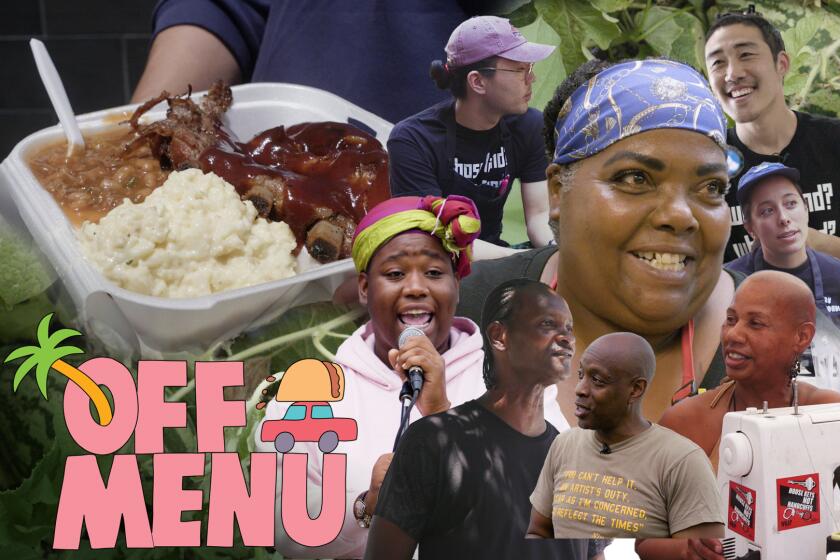Brewing hope and staying grounded: Skid Row Coffee
- Share via
Danny Park was 9 years old when he walked through one of downtown Los Angeles’s most poverty-ridden communities, Skid Row. His mother and father grabbed his hands and told him, “Let’s go, walk fast,” seeking to sprint past the scores of homeless people lying on the soiled sidewalk. But Park kept looking back at the hapless scene, yearning to help.
That desire must have been visceral. Twenty-three years later in 2016, Park quit a dream job at Nike — where he could work out in a state-of-the-art gym and try out the new products — to start a cafe on Skid Row.
Park has been no stranger to the neighborhood. His family, Korean American, has owned a liquor store in the heart of Skid Row since Park was 9 years old, though they clocked out each evening and hurried home to Downey.
On skid row, the epicenter of L.A.’s homelessness crisis, several organizations are working to ensure residents have healthy, dignified food choices.
Park grew up in the community, working at the family convenience shop in Skid Row from the age of 9 until departing for school at the Art Center College of Design. He wanted to venture into the design world, and got his wish.
In landing what he thought was a dream job at Nike, Park officially broke off from his family’s business back in Skid Row. Soon after, however, he realized the truth. Park achieved his aspirations in design but quickly noticed it simply wasn’t what he was meant to do.
Park, 33, has bold aspirations — ones that put him in the thick of a raging debate over how to address the nation’s biggest homelessness crisis. He envisions a glittering coffee shop, along one of the city’s most repellent boulevards, at which the homeless would serve mochas and croissants to their peers.
Eat your way across L.A.
Get our weekly Tasting Notes newsletter for reviews, news and more.
You may occasionally receive promotional content from the Los Angeles Times.
Park has a product, his first trainee and a growing fandom. If he can maintain the momentum, his Skid Row Coffee venture could become a textbook example of how a generation of young adults with bright ideas can begin to turn the homeless into the gentrifiers of their own neighborhoods.
“I couldn’t fathom how with situations such as Skid Row, we somehow normalize it in our conscience,” Park said. “I just knew I could do something. It didn’t have to be extraordinary, but just my presence and smile would be powerful.”
Giving up Nike
Park decided to give up his one-year gig at Nike in Portland, Ore., after several trips home. He saw the unthinkable, such as a young woman sitting in front of his family convenience store crying like a child.
He’d close the store to get work done in peace and could hear her screaming, “I don’t want to be here anymore!” It was always “gut-wrenching” for Park, he said.
While Nike supported his decision, many of Park’s closest family members and friends didn’t because they couldn’t comprehend why he would leave a steady job.
The coffee idea grew from his parents’ business. He’d seen the role his family convenience store, Best Market, plays as a gathering spot for community members.
Park called up a friend just before giving his notice, pitching him on the idea of “providing services and products that nourish body, mind and soul while uplifting the creative spirit.” Andrew Kang, a graduate in psychology at Long Beach State, expressing interest in the social aspects of the idea, jumped on board.
“I immediately knew that a space like this, if executed the right way, could be a component to fulfilling certain deficits for a hugely disenfranchised neighborhood,” Kang said. “It’s really important for Skid Row Coffee to stand as an example that you can start a business, or be interested in social work, and it can be ethically executed.”
Kang and Park began calling up vendors, settling on Bar Nine, which donates all the beans. They purchased two batch brews to serve five cups at a time and used Kang’s home grinder. Park recalls Friday nights when they’d stay up all night, brewing a minimum of three buckets of coffee. The two also bought 7½-liter kettles for hot water, brewing for three to four hours at a time. They’ve since upgraded to better batch brews and a commercial grinder, which simplifies the process.
Park has been identifying events where they could pop up temporarily, serve coffee and share their vision until they can find money and space for a permanent location.
The experiment begins
One of their first serviced events, a three-on-three basketball game at Gladys Park, instantly made the pop-up a community favorite. They didn’t charge for a cup of ice-cold coffee and went through hundreds of cups over a few hours.
They’ve come back to the park each month, drawing regulars such as a teenager who greets lines of soon-to-be customers with the question, “So you want it regular or tornado?”
The “tornado” was the boy’s creation — hot brewed coffee with added milk swirled to the top. And it’s become an early customer favorite.
“We have as much fun as he does,” Park said of the kid.
A registered nonprofit, Skid Row Coffee has expanded in little time over recent months to offer catered lunches to ad agencies and other businesses around downtown’s eastern edge.
Early efforts have shown Skid Row community advocates that Park and Kang are serious about their ambitions. It’s also intensified their own desires — Park says it’s become evident they’re deeply vested emotionally, physically and fiscally in Skid Row’s future. Critics unfamiliar with Skid Row believe that all residents are there by choice.
In the comments section of the Skid Row Coffee Instagram profile, one user said, “Here you go, replacing one drug habit with another.”
Walking a fine line
Park is trying to sell healthy meals that are affordable for low-income individuals. Wholesome foods are typically priced higher, but Park wants to adjust that standard through partnerships, sourcing and cost subsidies.
He has been inspired by the work of Homeboy Industries, an organization providing previously incarcerated people to work and earn money. Skid Row’s job-training program would teach trainees finance, technology and the steps of making quality coffee, concepts similar to how baristas are trained in traditional coffee shops. Park is meeting with businesses to gauge interest in partnering to hire graduates.
Park has his first trainee in 30-year-old Javon Burnett, who spent eight months in a mission on Skid Row.
Burnett was a regular at Park’s family store, conversing about upcoming Skid Row community events as he bought coffee each morning. Park soon introduced him to Skid Row Coffee and the job-training program concept.
“Poverty is a subject people don’t want to talk about because when you’re dealing with low-income, there’s also the crazies and drug addicts, so it’s a tough area but it does exist, and it needs to be tackled,” Park said.
Park has become a hero to Skid Row residents because he’s a semi-outsider who has ingrained himself in the neighborhood with a welcome product.
At a recent event on Skid Row, Park and Kang were serving free coffee when a resident offered Park a dozen hand-picked, wilted flowers.
“These flowers are for your mother,” said the middle-aged man, often seen with drips of Skid Row Coffee’s cold brew speckled through his shaggy white beard.
Park’s face lit up. At first, he declined: “You’re too kind, I can’t accept.” But the man insisted, and with a smile and a nod, Park took half of the bouquet.
Blake Atwell is a former member of the Los Angeles Times High School Insider program, an user-generated content platform where young people can post stories about their schools and communities. Atwell reported this story while he was a high school intern in 2017 with HS Insider’s summer internship program.
More to Read
Eat your way across L.A.
Get our weekly Tasting Notes newsletter for reviews, news and more.
You may occasionally receive promotional content from the Los Angeles Times.











